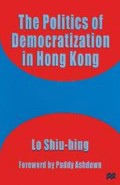Abstract
According to O’Donnell and Schmitter, a democratic ‘opening’ acts as a catalyst for the emergence of social groups spearheaded by intellectuals, who ‘press for more explicit democratisation or even revolution’.1 Moreover, ‘privileged groups’ including industrialists, merchants, bankers and land-owners start to ‘act like a de facto opposition’, although they are concerned that the democratic transition ‘will not stop at a point compatible with the contractual freedoms of the market or the cozy relationship they enjoy with the state apparatus’.2 On the one hand, intellectuals constitute the first social group to advocate further democratisation. On the other hand, to borrow Sundhaussen’s term, the ‘trading and manufacturing middle class’ supports some degree of democratic reform.
Access this chapter
Tax calculation will be finalised at checkout
Purchases are for personal use only
Preview
Unable to display preview. Download preview PDF.
Notes
Quoted in Zhang Youyu, ‘The Reasons for and Basic Principles in Formulating the Hong Kong Special Administrative Region Basic Law, and its Essential Content and Mode of Expression’, prepared by the Secretariat of the Basic Law Consultative Committee, reference no. 7 (August 1988), p. 7. Also see Deng Xiaoping, Fundamental Issues in Present-day China (Beijing: Pergamon Press, 1988), p. 52.
Louis Cha, On Hong Kong’s Future: A Collection of Ming Pao’s Editorials, translated by Stephen Wang (Hong Kong: Ming Pao Daily News, 1984), p. 306.
Ophelia Cheung-Macpherson, a former District Officer of the Hong Kong government, interviewed by Gerd Balke in Balke, Hong Kong Voices (Hong Kong: Longman, 1989), p. 165.
John Walden, ‘Implementation of the Sino-British Joint Declaration’, in T. L. Tsim and Bernard Luk, eds., The Other Hong Kong Report (Hong Kong: The Chinese University Press, 1989), p. 51.
Richard Chuang, ‘“Home” Insurance for British Nationals in Hong Kong?’, Asian Affairs: An American Review, vol. 17, no. 1 (Spring 1990), p. 40.
SCMP, August 30, 1989, p. 7. Also see The New Hong Kong Alliance, A Discussion of ‘One Legislature, Two Chambers’ (in Chinese) (Hong Kong: no publisher, 1989), pp. 2–3.
Cheung Kit-fung et al., Fifty Years Unchanged? (in Chinese) (Hong Kong: Tide, August 1991), p. 179.
See San Mui (New Seedling Society), Resolutely Maintain the Demands of the Democratic Camp: Discuss the Basic Law and Political Reform (in Chinese) (Hong Kong: no publisher, 1989), p. 2.
Author information
Authors and Affiliations
Copyright information
© 1997 Lo Shiu-hing
About this chapter
Cite this chapter
Lo, Sh. (1997). Popular Response to Reform. In: The Politics of Democratization in Hong Kong. Palgrave Macmillan, London. https://doi.org/10.1007/978-1-349-25467-5_4
Download citation
DOI: https://doi.org/10.1007/978-1-349-25467-5_4
Publisher Name: Palgrave Macmillan, London
Print ISBN: 978-0-333-68392-7
Online ISBN: 978-1-349-25467-5
eBook Packages: Palgrave Political & Intern. Studies CollectionPolitical Science and International Studies (R0)

